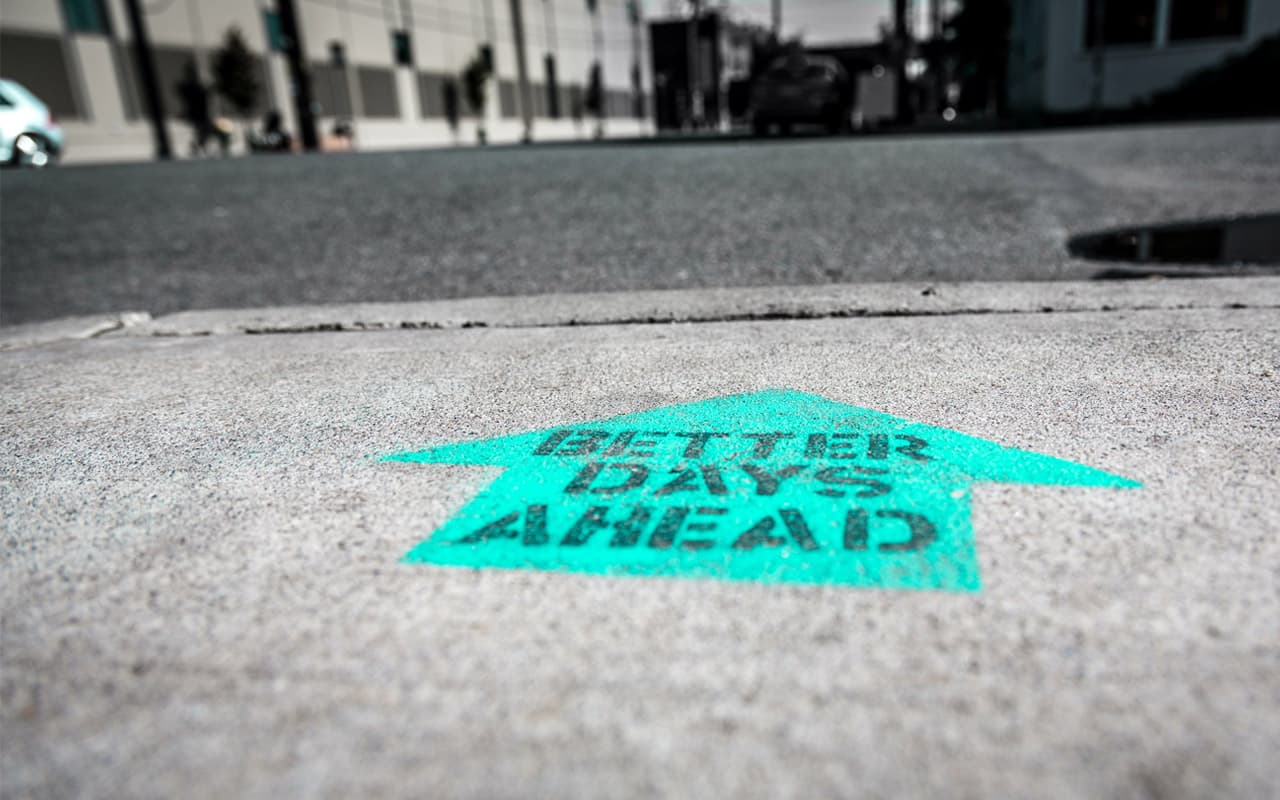Living with Chronic Illness: 5 Values I Use to Navigate the Tough Times

Written by Declan Davey on Wed Dec 02 2020.

Arthritis, Crohn’s disease, multiple sclerosis…
The list of chronic illnesses and diseases is long indeed. And as much as we love to think we’re invincible, we’re all vulnerable to them.
Over 40% of Americans have at least one chronic disease, and more than 15 million out of 66 million Brits are affected.
In my case, it was a bacterial infection called Lyme disease that turned my life upside down.
I worked as a psychologist in London. Ran half-marathons and Tough Mudders. Traveled around Europe. All in all, I was a healthy, fully functional son, partner, and friend. But by my 26th birthday, I seemed to no longer be any of those things.
The four years since then have been my most challenging so far (to say the least), with plenty of dark days and a few silver linings.
If you’ve been living with a chronic illness, then I’m sure you’ll know how it goes: Unpredictable, painful symptoms that come out of nowhere. Doctors’ appointments that leave you with more questions than answers. Feelings of frustration, isolation, weakness, and practically everything in between.
It sure isn’t a walk in the park, this chronic illness gig. But I must say, life is better now than it was a few years back — and I’m grateful for that. Ask me in 2017 if I’d have taken a 50-60% improvement in my health and I’d have said yes.
Of course, ultimately, everyone’s experience with chronic illness is different. I’m not going to suggest you should “eat more vegetables” or “look after your sleep” — these strategies can help, but it’s usually not as easy as that.
What I can say is that there is a list of five values I try to live by. They’re almost like compass points that I can reference whenever there’s a setback or I feel a lack of control.
Maybe other values will be more relevant to you, and that’s fine. Please feel free to come up with your own. But in this article, I’ll do my best to explain why each value is meaningful to me.
Awareness
You always hear the advice to “live in the present moment”, so why do we struggle so much with staying present? Well, no one knows exactly. But the fact is, we spend a lot of time oscillating between the past and the future.
The mind loves to keep busy, busy, busy…ALL the darn time! Yet when you’re living with a chronic illness, life often slows down. You can’t do as much as you once did. So what happens?
You have more time to think — and that’s not necessarily for the best.
I found that my mind would swing from a sort of “mourning” for my previously healthy self and then move over to “worry overdrive” mode, thinking about the future.
My prospects seemed bleak. I saw myself in pain, alone, and broke from all the medical bills. If you’ve had similar worries, you’ll know they make your body feel even tenser than it is already.
This is why awareness is the number one value on my list. And I promise it’s not just because it begins with “a”!
Awareness can help you cut through some of the mental clutter that inevitably comes with a chronic illness or disease. And in my experience, through increased awareness, I’ve been able to get better at “spotting” and “dropping” negative thought patterns.
Now, is it a foolproof strategy? No. I still lose patience. I still get annoyed when stubborn symptoms prevent me from doing something I want to do or going somewhere I want to go. But developing a greater sense of self-awareness day to day does seem to help me.
There are different ways to practice. Meditation and yoga are two of the most popular. I’ve dabbled with both (and enjoyed both), even though I slacked off and didn’t keep them up.
What I’m actually finding most useful right now is something I call “mindful moments.” They’re basically short moments of, say, three to ten seconds, where I pause and either a) take a deep breath, b) smile, or c) both.
Even if the last thing I want to do at that moment is smile, it can be refreshing to practice awareness in this way. If you can manage it even a couple of times a day, you may find that it starts to kickstart a nice habit.
You’ll get a little break from the mind — which tends to like making the fatigue, aches, and pains even worse than they need to be by thinking about them over and over again.
Courage
“Chronic illness warrior” is a term that gets thrown around, and personally, I’m split on whether it’s helpful or not. Trite well-wishes like “keep fighting” and “don’t give up” are meant to encourage, but they can be irritating, too.
While chronic illness is a fight, you can’t always be in fight mode. Keeping up the warrior act is exhausting. I’ve had to accept that it’s okay to allow myself to be honest about how I feel — even if I’m far from perfect at expressing my emotions.
You see, I want to be the provider. The protector… Not the person who needs to be supported or cared for.
So to me, courage isn’t just a matter of keeping quiet, “rolling up your sleeves,” and battling on. It’s also about opening up. Not being afraid to tell family, friends, or health professionals what’s really going on.
If you’re like me, it will feel weird to do so… awkward, and almost unbearably so. But I’ve come to believe that having the courage to speak out is one of the best ways to release the chronic illness “pressure valve.”
Curiosity
When you’re living with a chronic illness, it can sometimes feel like the walls are closing around you. Your world seems to get smaller and smaller, which is why I think it’s so vital to make the most of anything you can to remain “engaged” with life.
While you might not be able to do option a) or b) at the moment, is there an option c)? (By the way, option c) could be something that you’ve never done before.)
For example, I didn’t plan to spend hours upon hours researching all the ways I could promote my health. Detox techniques, organic cooking, herbal blends — all topics I probably wouldn’t have delved into if it weren’t for the illness.
I’ve tried to maintain my curiosity to read, listen to podcasts, and watch documentaries. To keep learning about new things, even in the worst times — and even when my tired brain forgets most of it.
Playfulness
Life can feel increasingly “serious” when you’re managing a chronic illness. And in reality, there might not be much to smile about. But even if laughter alone isn’t a cure, it has helped me on my journey so far.
Whether it’s comedy movie nights, looking at goofy memes, or funny cat videos on YouTube… Could you spend five minutes a day doing an activity to keep a little playfulness in your life?
It might feel forced at first, but anything that brightens your day and takes away some of the stress can’t be a bad thing.
Responsibility
Did you know that the origin of the word responsibility actually means “to respond”? People with chronic illnesses sure have to do a lot of that!
A lost job here, frayed relationships there… all in all, it’s a good deal of unpredictability we have to respond to.
There’s a reason they say chronic illness is like a full-time job, with all of the treatment plans that often need to be followed. And I think this is an interesting way to think about it…
If you can’t work due to the effects of the illness, could you approach trying to improve your health as a full-time job? A responsibility that, for whatever reason, is what you’ve been assigned to do right now? And yes, this does include committing to rest days.
By focusing on supporting your health, no matter what happens you can have the peace of mind to think: “Hey, I’m honestly trying my best here — and that will have to do.”
Conclusion
If you asked me to sum up what living with a chronic illness is like in one word, then the word I’d choose is “heavy.”
It’s a heavy load to carry, across the spectrum of life — physically, mentally, financially, and spiritually. It chips away and can wear you down.
The “why me?” question often pops up, and it’s a very valid one. What’s happened to you doesn’t feel fair. And it isn’t fair.
Truly, I can’t promise everything will turn out alright in the end, because when people have told me this, I haven’t always believed them.
All we can do, in my opinion, is take what’s here for us in the present moment and make the most of it. Look for the glimmers of hope and progress. The better days. This can, at least, make the suffering a little less overwhelming.
While the values above aren’t miracle cures, they do continue to help me navigate the tough times. I hope that, maybe, they can help you, too.
If you or a loved one needs support with finding home health products to manage a chronic illness, you’re welcome to contact the Carewell team on:
Call: (800) 696-CARE Email: support@carewell.com

Declan Davey is a health and wellness copywriter from London, UK. His background includes roles as a psychological therapist for Islington Memory Service, where he worked with family caregivers, and as a rehab assistant at Camden Neurology & Stroke Service.